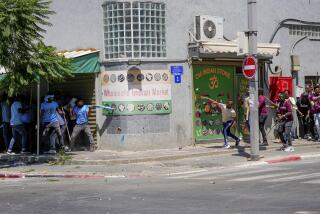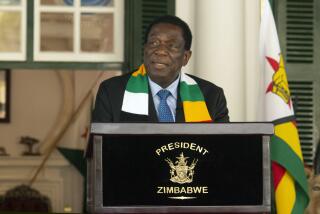Zimbabwe opposition supporters beaten
- Share via
JOHANNESBURG, SOUTH AFRICA — Nyasha Putana could not help crying in pain as ruling party supporters in Zimbabwe whacked his buttocks and the soles of his feet in front of hundreds of fellow villagers.
At least five people died from beatings at Monday’s “political meeting” at Dakudzwa village, about 60 miles north of Harare, in Mashonaland, according to witnesses, the opposition Movement for Democratic Change and a human rights worker who requested anonymity for fear of reprisals.
“They were saying, ‘We are saving the country by pain,’ ” said Putana, 32, speaking softly from his hospital bed in Harare, Zimbabwe’s capital, on Wednesday. “I cried. It was very painful. Right now I can’t walk. I can’t even stand.
“They were reading out names from a list. They said, ‘This one is from the opposition, this one is from the opposition.’ I was beaten on the buttocks and feet for over an hour. I was nearly unconscious when they left me.”
Zimbabwe Assn. of Doctors for Human Rights, a human rights group that is keeping track of victims of Zimbabwe’s political violence, estimates that thousands of people have been injured in attacks and beatings targeting opposition activists since the March 29 presidential and parliamentary elections. About 700 people are known to have been treated by doctors, the group says.
Many of the injured cannot get to clinics because of transportation and financial problems, or because ruling party leaders in rural areas deny some people access to hospitals.
The MDC reports 24 of its activists have been killed in postelection violence.
The violence is concentrated in Mashonaland and Manicaland, traditional ruling party rural strongholds that swung their support to the MDC in the election. The ruling ZANU-PF lost control of the parliament, and opposition leader Morgan Tsvangirai won the most votes in the presidential election but did not receive the 50% plus one required to avoid a runoff, the Zimbabwe Electoral Commission said.
During the Monday beating incident, about 100 ruling party supporters arrived at dawn, ordering people from their houses in Dakudzwa and about seven other nearby villages to a central point near a Catholic church, according to witnesses interviewed by The Times by phone. About 400 villagers were gathered outside the church.
“They started telling us, ‘We’re not going to do anything, we’re just campaigning. You’re not supposed to vote for the opposition party. If you are opposed to the ruling party you should come up and confess and we won’t do anything to you,’ ” said Rebecca Vela. “More than 10 confessed; they all got beaten. The women were beaten naked.”
Vela said she watched as her husband, Andrew, a teacher, was beaten until he was unconscious. Teachers were among the first to be targeted, she said.
Several dozen others were beaten when their names were read from a list, witnesses said. If a man on the list was not present, his wife, child, sibling or parent was taken and beaten instead, the witnesses said.
The youth militias and ruling party members, who had access to voting figures for the area (which were posted outside polling booths during the election), threatened at one point to beat everyone present, because 151 people in the area had voted for the opposition, according to witnesses.
The victims were dragged some distance away to be beaten under a group of gum trees. They were handcuffed and had pieces of cloth stuffed in their mouths to dull their cries, the witnesses said.
“They had logs, big logs,” said Rebecca Vela. “They were beating them on the buttocks. They were beating them on the legs and under the feet. The situation is bad.”
The runoff date has not yet been announced, but the U.S., Britain and human rights activists in Zimbabwe have questioned the practicality of a second round of voting, in an atmosphere of mounting violence.
Brian Raftopoulos of the Solidarity Peace Trust, who recently returned to South Africa from Zimbabwe, said it was clear the violence was targeted at opposition activists and supporters.
“The idea is clearly to demoralize MDC structures and to discourage people from voting in the runoff. My own sense is that a lot of the people who have been beaten are unlikely to go out again and vote in a runoff. I think they have been very traumatized,” he said.
A South African government representative on the Southern African Development Community’s regional observer team, Kingsley Mambolo, said it was not possible to hold a runoff under existing circumstances.
--
More to Read
Sign up for Essential California
The most important California stories and recommendations in your inbox every morning.
You may occasionally receive promotional content from the Los Angeles Times.










